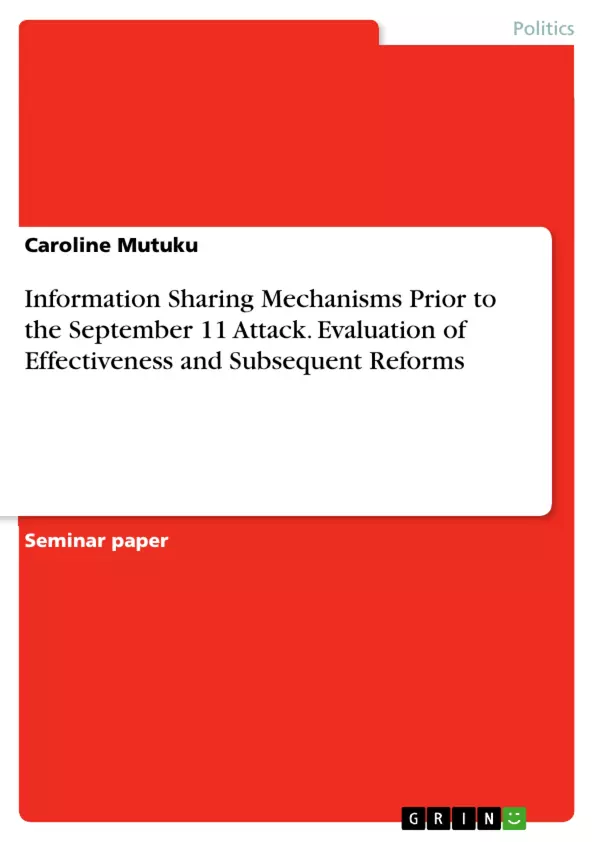September 11, 2001, a terrorist attack on the U.S cities occurred to the Americans and the world at large. This attack was regarded as one of the most disastrous failure of the U.S. intelligence, which caused 3,000 deaths. This failure was attributable to the unprecedented ineffectiveness of information sharing mechanisms.
Therefore, this case study will give an evaluation of the effectiveness of information sharing regarding the 9/11 attack and the subsequent reforms.
Inhaltsverzeichnis (Table of Contents)
- Abstract
- Introduction
- Intelligence Failures of the attack of September 9/11
- Remedy to the Lack of Intel Sharing
- Post 9/11 Intelligence Reform
- Productivity of the Policies
- Conclusion
- References
Zielsetzung und Themenschwerpunkte (Objectives and Key Themes)
This case study evaluates the effectiveness of information sharing mechanisms in relation to the 9/11 terrorist attacks and the subsequent reforms. It aims to analyze the intelligence failures that led to the attacks and assess the impact of post-9/11 intelligence reforms on information sharing practices.
- Intelligence failures leading to the 9/11 attacks
- Ineffectiveness of information sharing mechanisms among U.S. intelligence agencies
- Impact of post-9/11 reforms on intelligence sharing practices
- Cultural barriers hindering effective information sharing
- Importance of a culture of information sharing within intelligence agencies
Zusammenfassung der Kapitel (Chapter Summaries)
- Abstract: This section introduces the 9/11 terrorist attacks as a significant intelligence failure, attributing it to ineffective information sharing mechanisms. The study aims to evaluate the effectiveness of information sharing in the context of the 9/11 attacks and the subsequent reforms.
- Introduction: Provides an overview of the 9/11 attacks and highlights the role of information sharing in preventing such incidents. It suggests that the attacks could have been avoided with effective information sharing policies implemented by the Clinton and Bush Administrations.
- Intelligence Failures of the attack of September 9/11: This chapter delves into the specific failures of information sharing during the 9/11 attacks. It highlights instances of delayed communication between FAA and NORAD, as well as the lack of communication regarding the disappearance of Flight 77 from the radar. The chapter also presents evidence of the U.S. intelligence agencies' failure to share critical information about the Al Qaeda plot, such as the Phoenix memo and the CIA's intelligence report on Zacarias Moussaoui.
- Remedy to the Lack of Intel Sharing: This chapter focuses on the measures taken to address the shortcomings of information sharing identified in the aftermath of the 9/11 attacks. It explores the post-9/11 intelligence reforms and their effectiveness in promoting a culture of information sharing.
Schlüsselwörter (Keywords)
This study focuses on the themes of information sharing, intelligence failures, 9/11 terrorist attacks, post-9/11 reforms, and intelligence community culture. Key concepts include intelligence agency coordination, interagency communication, national security, and the importance of a culture of information sharing for effective counterterrorism efforts.
Frequently Asked Questions
Why was the 9/11 attack considered an intelligence failure?
The failure was attributed to ineffective information sharing mechanisms between agencies like the CIA, FBI, and FAA, which prevented a clear picture of the threat from emerging.
What is the "Phoenix memo"?
It was a critical piece of intelligence regarding Al Qaeda's interest in flight schools that was not effectively shared or acted upon prior to the attacks.
How did communication fail during the actual attacks?
There were significant delays in communication between the FAA and NORAD, particularly regarding the disappearance of Flight 77 from radar.
What were the key post-9/11 intelligence reforms?
The reforms aimed to restructure the intelligence community to promote a culture of information sharing and better interagency coordination.
What cultural barriers hindered information sharing?
Agencies often operated in "silos," with a culture that prioritized keeping information within the agency rather than sharing it for national security.
- Arbeit zitieren
- Caroline Mutuku (Autor:in), 2018, Information Sharing Mechanisms Prior to the September 11 Attack. Evaluation of Effectiveness and Subsequent Reforms, München, GRIN Verlag, https://www.grin.com/document/428838



